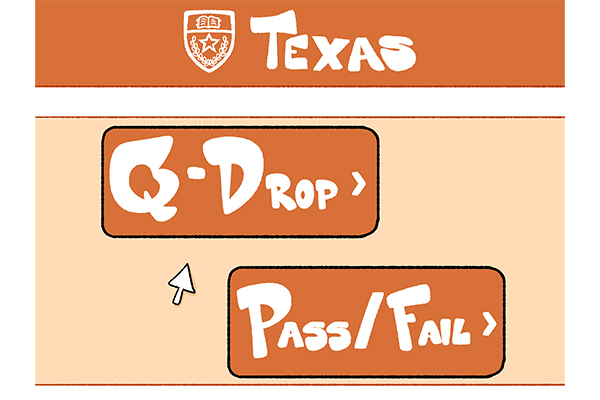Student Q-drop rates remained similar to previous semesters this fall despite the transition to online courses for fall 2020.
Mark Simpson, assistant vice provost and University registrar for the Office of the Registrar, said 9.29% of students Q-dropped at least one class this semester as of Nov. 8. At this time during fall 2019, 8.66% of students had dropped a class, he said.
“Students are staying in class and they're finishing, and to me that's a positive story that we’re normal,” Simpson said.
Simpson said the Q-drop rate follows the pattern of the past two fall semesters. He said at the end of fall 2018, 15.45% of students Q-dropped at least one class, and in fall 2019, 15.06% of students Q-dropped at least one class. Simpson said he expects similar rates by the end of the semester.
The University’s Q-drop policy allows students to drop a class for academic or non-academic reasons, Simpson said in an email. He said students with non-academic reasons can still drop a class after the deadline using their One-Time-Exception, but it will still count toward the six Q-drop limit.
Sociology sophomore Twila Robedee said she Q-dropped her chemistry course after being unable to keep up with work when she tested positive for COVID-19. Robedee said Student Emergency Services offered to send absent notifications to professors regarding COVID-positive students, but her work piled up when she took time off.
“Due to fatigue, a (COVID-19) symptom, I physically could not do much school work before getting exhausted,” Robedee said. “The recovery process included a lot of time in bed while my body was fighting off the virus.”
Computer science senior Ben Carter said he used his One-Time-Exception for his neural networks class. He said the format of the course, where students learned material outside of class and completed assignments in class, made it difficult for him to put in the same effort in an online format.
“I don't enjoy school online,” said Carter. “I certainly don't feel like I'm learning as much, and I'm just to the point now where I’m about to graduate and I really don't care. I just want to get it over with.”
Simpson said there has also been a slight decline in withdrawals from the University this semester compared to previous fall semesters. He said this was partially because the faculty have been willing to help students create a new plan.
“We're reaching out to students anytime a student withdraws,” Simpson said. “Our Graduation Help Desk staff is just awesome and they're working out that they reach out to students to try to make sure that there's some kind of an intervention to find out, ‘Hey, you're withdrawing. How do we get you back?’”





















